Session 14 - Ephesians
Author
Paul wrote to the church/es in Ephesus (located in modern Turkey). He had spent time there on at least two occasions, totaling some three years, a long time for Paul: (Acts 18:18-21; 19:1-41).
Date of Composition
About 60-61. Paul was in prison at the time. He also wrote Philippians, Colossians, and Philemon, so the four letters are known as the "Prison Epistles". Ephesians, Colossians and Philemon were scribed by Tychicus, and sent accompanied by Onesimus (Ephesians 6:21; Colossians 4:7-9; Philemon 1:10-12). There are significant overlaps between the messaging in Ephesians and Colossians.
Ephesus was the commercial, political and religious centre of what was then called Western Asia and is now part of Turkey. At the time the epistle was sent it had a population of roughly a quarter of a million, which made it the second largest city in the empire; this figure was in constant flux because Ephesus was located at the crossroads of the Roman Empire.
For more than seven hundred years people from other parts of the empire had flocked to Ephesus to pay homage to the fertility goddess Artemis (her Greek name) or Diana (her Latin title). The Temple of Diana was four times the size of the Parthenon in Athens and was identified as one of the seven wonders of the ancient world. Ephesian merchants sold miniatures of the Temple of Diana to pilgrims and tourists. Income from these sales enriched the city and gave employment to the artisans. There were other temples, including shrines to the imperial cult (worship of Caesar).
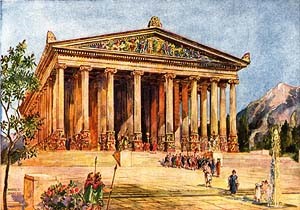
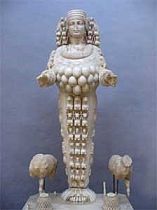
Artemis/Diana
As the Gospel spread, collisions with the existing religious systems were inevitable. The ancient pagan cults were no match for the message of Jesus Christ and great numbers of followers of Diana became Christians (read the full account in Acts 19).
Many were set free from the power of occult. Social barriers among them were dismantled. The power of sin was broken, giving them hope beyond their political, social and economic circumstances. So many were converted to Christ that, on one occasion, a great bonfire took place, in which books and other artefacts of the occult were destroyed. The church in Ephesus went on to become the strongest church in the first century.
Inevitably, forces opposed to the growing Christian community were bound to react. The proclamation of the Gospel was first denounced in the synagogue, by followers of the Jewish religion who refused to recognize Jesus as the Messiah. So, for two years, the work continued in a nearby hall. The flash point came when the shrine artisans lost so much business that they went on strike, led by one Demetrius, who led crowds of angry people into the city's 24,000 seat arena. As the stands filled, Scripture tells us that most people did not even know why they were there, but they clamoured on Diana's behalf when stirred up to do so. By the end of the day, the opposition fell silent and the preaching of the Gospel expanded. From across the entire region people heard the message of salvation. The church grew progressively stronger. As Paul travelled he kept in touch with the congregations he helped plant. Often arrested by his enemies, he did not cease to proclaim the message. In chains, he wrote to the church in Ephesus, declaring the greatness of the salvation they enjoyed. (Because of his incarceration he was sometimes forced to use the services of an amanuensis, or scribe, to take down his words.)
Over time, the church in Ephesus became a mature congregation, a multicultural church with a sophisticated understanding of the depth of the message they had embraced. Chapters 1-3 of Paul's letter describes in vivid detail our calling as believers, the privileges and blessings that are ours to enjoy in Christ, our new relationship with God and His purpose and plan for us, as individuals and as part of the broader Christian community. We often focus on the "weeds", the minutiae of our day-to-day lives and struggles; God sees the future and acts in line with His "bigger picture".
Most of the epistles written by Paul (and others, such as Peter and John) are about issues faced by their recipients. However, for the Ephesian church, it is not until Chapter 4 that we start to get some hints as to what was going on. The first matter addressed is "unity" within the local community of faith.
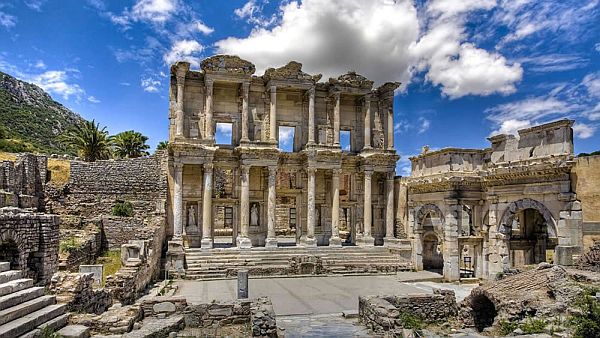
Ephesus
The Ephesian Christians lived in an environment conflicted by a panoply of gods, a vast array of religions, differing social histories and schools of philosophical thought. Jewish converts to Christianity (there was a sizeable Jewish population in Ephesus) often separated themselves from Gentile (or non-Jewish) converts, because the latter had not come to Christ through adherence to Moses and the Laws contained in the Old Testament, and tried to introduce legalism that was foreign to those from Greco-Roman or local cultural backgrounds.
Masters and slaves were difficult to unite. There was incredible spiritual opposition. The church needed to know how to handle the emerging differences and live the life God had called to practice.
Location, Purpose and Audience
Ephesians is a "big picture" letter. Unlike a number of Paul's other letters, Ephesians was not written to deal with problems in the church. It is clear that Paul wants them all to grow and mature in their faith in Christ and for leaders in the church to exercise their calling to the full.
Church historians have noted that this epistle was copied and read widely among the churches, not just in Ephesus.
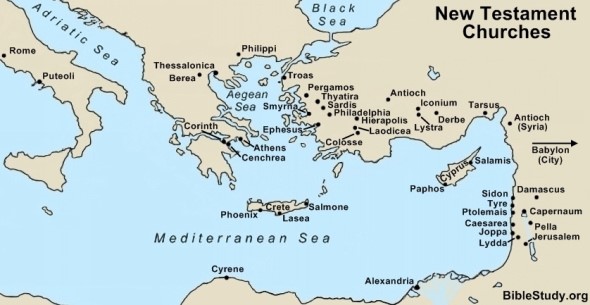
Literary Style and Structure
Ephesians deals with topics at the very core of what it means to be a Christianóboth in faith and in practice. The first three chapters lay out a strong doctrinal basis. The second three chapters outline how Christian makes a difference in the way we live.
| 1:1-23 | - | our position in Christ, as believers |
| 2:1-22 | - | saved by grace - what we once were; what we now are; a unified temple, a place for God to live |
| 3:1-21 | - | understanding God's revealed mystery |
| 4:1-32 | - | the Christian life |
| 5:1-20 | - | following Christ |
| 5:21-6:9 | - | living with others as Christians in a non-Christian world |
| 6:10-24 | - | our spiritual warfare |
Key Issues
The two big themes in Ephesians are (i) Christ and (ii) the Body of Christ, the "ekklesia", the "called out ones", not just the church in Ephesus. This is the only epistle of Paul that describes the church universally, not just in reference to a single location.
Christ
Ephesians is all about Jesus. He is exalted and enthroned far above all.
"(God) raised Christ from the dead and seated him in the place of honour at God's right hand in the heavenly realms. Now he is far above any ruler or authority or power or leader or anything else - not only in this world but also in the world to come. God has put all things under the authority of Christ and has made him head over all things for the benefit of the church. And the church is his body; it is made full and complete by Christ, who fills all things everywhere with himself." (1:20-23)
... and we have "every spiritual blessing" in Christ
"All praise to God, the Father of our Lord Jesus Christ, who has blessed us with every spiritual blessing in the heavenly realms because we are united with Christ." (1:3)
Chapter 1 contains an inspiring summary of what we have in Christ. He is mentioned 15 times in vv. 1-14. Almost like standing at a look-out, seeing a great panorama. We see who we are in Christ. We have status in God's eyes. We have relationship with Him. We are forgiven, saved by His blood. The Creator is our heavenly Father; we are adopted in Christ (we were not always His children). His Spirit lives in us. We have been given His gifts lavishly. But we can only grasp it with revelation.
If we do not have Jesus, we don't have those blessings. Salvation is not ours because we earned it, but because God planned it. His intervention in our lives shapes us.
Everything we have is in Christ. We are:
- in Christ - 1:1
- blessed in Him - 1:3
- chosen in in Him - 1:4
- adopted through Him - 1;5
- accepted by God through Him - 1:6
- redeemed (bought back from captivity and set free) - 1:7
- and forgiven in Him - 1:7
- shown God's will in Him - 1:9
- centred in Him - 1:10
- heirs through Him - 1:11
- glorified in Him - 1:12, 13
- given God's wisdom through Him - 1:17
- given hope in Him - 1:18
- given power in Him - 1:19,,20
- made alive again in Him - 2:5, 6
- drawn near in Him - 2:13
- enabled to grow in Him - 2:21
- built up in Him - 2:22
- made partakers of all His promises - 3:6
- the manifestation of God's wisdom - 3:10, 11
- given boldness and access through Him - 3:12
Grace and faith
"God saved you by his grace when you believed. And you can't take credit for this; it is a gift from God. Salvation is not a reward for the good things we have done, so none of us can boast about it. For we are God's masterpiece. He has created us anew in Christ Jesus, so we can do the good things he planned for us long ago." (2:8-10)
Paul's Great Prayer of Praise and Intercession for the Ephesian Christians
Read vv. 15-23. Seek to apply it in your life and personal circumstances.
Breaking Down Ethnic Divisions
As we have already seen in Galatians, birthing the new church involved bringing together Jews and Gentiles (who were once regarded as far removed from both God and His chosen people), without distinction. Ephesians gives more details of that reconciliation. Paul says that it is a mystery, in which there is neither Jew nor Gentile, neither slave nor free.
"So now you Gentiles are no longer strangers and foreigners. You are citizens along with all of God's holy people. You are members of God's family. Together, we are his house, built on the foundation of the apostles and the prophets. And the cornerstone is Christ Jesus himself. We are carefully joined together in him, becoming a holy temple for the Lord. Through him you Gentiles are also being made part of this dwelling where God lives by his Spirit" (2:19, 22)
Ministry Gifts
Paul teaches us in his letter to the Ephesians that Jesus gave [Gk. literally "supplied, furnished"] some to be apostles ["commissioned, sent out, delegated"], some to be prophets ["those who speak out, announce, under inspiration"], some to be evangelists ["bringers of good news"] and some to be pastors ["shepherds, protectors, overseers] and teachers, to prepare [completely equip] God's people for good works [business, enterprise, undertaking] of service, so that the body of Christ may be built up until we all reach unity in the faith and in the knowledge of the Son of God and become mature, attaining to the whole measure of the fullness [completeness; like a ship full of sailors, rowers and soldiers, and ready to set sail] of Christ" (Eph 4:11-13).
The Ephesian church, like many Christian communities of the era, faced tremendous winds that buffeted its members. Lives were shipwrecked. (Read some of the other letters, such as Colossians, and consider the waves and winds of doctrine that made people dizzy and swept them along, first in this direction, and then in the other.) They were "carried about" (the Greek suggests a violent swinging). People today are out to shipwreck the faith of Christians. If we are not strong, it is easy to be tossed dizzyingly, out of control. God wants you to have stability.
Paul uses a second analogy in Ephesians 4, one related to gambling. He describes enemies of the Christian faith "lying in wait to deceive" (from the Greek concept of kubia, or playing with dice, gambling). There are cunning people and false agendas at work in our societies, waiting to catch us off-guard by manipulating the dice, so to speak.
It is easy to be trapped, unable to discern what is going on. If you are not watching, they will play tricks with your eyes. Happily, the Holy Spirit is available and waiting to come alongside to advise and guide you.
When this happens, the results will be maturity, growth, security and unity and we will all know God better. Jesus is building one Body (Eph 4:16). There is one head (there can only be one). Some gods in Paul's day had numerous heads. In the Christian life there is only one source of life, one way to God. The word "equip" used here is the same as "repairing" (nets, for example in Mt 4:21). There are other ministries mentioned in the New Testament (cf 1 Corinthians 12:28 and Rom 12), in addition to those mentioned in this passage; the purpose of them all is to unite, to connect and build. They have been put in place by Jesus Christ to develop the entire church, to enable us to fulfil the works to which God has called us (read Ephesians 2:10), works that make divine "poetry" out of our lives and circumstances.
The role of these ministry gifts is to release and mentor people with abilities to minister ("serve") and work together under God to ensure that every gift and calling are maximized. For this to happen, unity is paramount. "Can two walk together unless they are agreed?" asked the prophet Amos (Amos 3:3).
The Holy Spirit
The dynamic of the church is the Holy Spirit. Apart from the Holy Spirit, the Church would not exist. He has come to give the Body of Christ:
- revelation of Jesus Christ - without revelation we would not understand the Gospel
- birth and spiritual life
- access to God's presence
- members/relationship with the Body of Christ
- divine power
- supernatural comfort and joy
- guidance
- unity
- teaching
- leaders, equippers and other ministers
- spiritual freedom
- ability to live holy lives (sanctification)
- fruit - in our personal lives
- gifts - in our personal and corporate lives
We should claim the power and presence of the Holy Spirit in our experiences. Two additional symbols are used:
Seal - Ephesians 1:13; 4:30
- seal implies ownership and responsibility - we belong to Him (have the seal, or branding, of God in us (cf 2 Timothy 2:19)
- security - in Roman times, a person found tampering with official seals was judged severely. We must not break the seal either - Ephesians 4:30
- authority - someone using the seal of another (eg a person in power, such as a Governor) acted with their authority - we have Christ's authority for His work in and through us (Matthew 28:18-20).
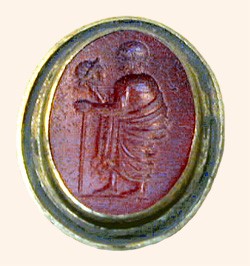
A seal from New Testament times
Earnest - Ephesians 1:14
- down-payment, deposit, guarantee of balance of payment to come.
Areas of Christian unity
The Holy Spirit is building a "temple in the Lord" - Ephesians 2:21, 22. He gives the church unity - 2 Corinthians 2:13; Ephesians 4:3.
"This will continue until we all come to such unity in our faith and knowledge of God's Son that we will be mature in the Lord, measuring up to the full and complete standard of Christ." (4:13)
This unity is not the result of organized ecumenism or just a cessation of hostilities, but the supernatural work of God. Christ is our "peace":
"For Christ himself has brought peace to us. He united Jews and Gentiles into one people when, in his own body on the cross, he broke down the wall of hostility that separated us. He did this by ending the system of law with its commandments and regulations. He made peace between Jews and Gentiles by creating in himself one new people from the two groups. Together as one body, Christ reconciled both groups to God by means of his death on the cross, and our hostility toward each other was put to death. He brought this Good News of peace to you Gentiles who were far away from him, and peace to the Jews who were near. Now all of us can come to the Father through the same Holy Spirit because of what Christ has done for us." (2:14-18)
There are seven areas of unity identified in Ephesians 4:3-6.
- One Body- the writer looks at the unity of the physical body. Imagine if every part is off doing its own thing. It is inconceivable. We are one, yoked together in Him. We are all connected.
- One Spirit - He is our "earnest" (the deposit of God in our lives while we wait for heaven) and seal (we are identified as genuine children of God by his seal of ownership and authenticity in us). We have "access by one Spirit to the Father" (1 Cor 12:13).
- One hope - one target, one eternal goal, knowing which gives us determination and conviction in the face of uncertainty and despair.
- One Lord - we owe Him our allegiance. But we can only do this with the enabling of the Holy Spirit (1 Cor 12:3).
- One faith - one way to God, to secure eternal life; one simple faith in Christ, who came into the world to save sinners (1 Tim 1:15).
- One baptism - faith is internal, baptism is external. We are baptized into Christ. Physical baptism is our badge, a sign of an inner work.
- One God & Father of all - There are three world religions that emphasize the oneness of God. They are Judaism, Christianity and Islam. "Hear O Israel, the Lord our God, the Lord is One" (Deut 6:4). Before they became Christians the ancient Ephesians worshipped many gods. The Greeks mocked and taunted their gods and made up stories depicting the follies of the deities. If the gods came to earth, they did silly things; they acted like people and got into trouble. So the best thing for the gods was to stay in the mountains and not come anywhere near human civilization. The shocking thing about the Gospel is that God came down to us (Eph 4:8-10). That is what the "incarnation" is all about.
Christians know God as "Father". Jesus told us that we see Him we also see the Father. He and the Father are one. Under the old covenant, Jews and Gentiles were completely divided. Jesus tears down walls between people; He pursues us with a spirit of reconciliation; He offers hope, makes poetry of our lives, fills us with His presence. Our unity is to be modelled on God's unity. Just as God the Father and the Son are One, we are called to be one. Self-centredness, pride, ambition, negative attitudes, individualism, sulkiness, grumpiness, poor attitudes and lack of forgiveness have no place in this economy. God is our Father; we are His children; the relationship between us as Christians is closer than our family ties. So, we need to put aside things that divide us but are not germane to our faith.
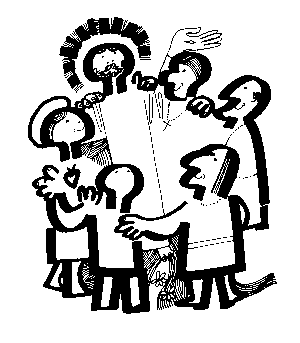
We do not achieve unity as Christians just because we say it exists. Ironically, Christians are often divided over whether or not they are united. That does not make sense. There are some clues in Chapter 4, verses 1 and 2.
- lowliness/humility - this attitude is the opposite of self-centredness and pride. Our natural ambition is to exalt self ahead of being submitted to the real Head, Jesus Christ. In the Old Testament, lowliness was seen as being slavish, which was not a virtue. Christ made a virtue out of humility. What can be more humbling than the incarnation, the Creator becoming like the created? He emptied Himself of all the glory He shared with the Father from the beginning of time. Lowliness means not thinking more highly of ourselves than we should (Rom 12:3), letting go of pride, knowing ourselves, accepting who we are, rather than who we are not.
- gentleness/meekness - meekness is like the attitude of a strong animal that is disciplined and controlled. By nature we are self-important. We present lists of demands. We proclaim that "No one is going to ride roughshod over me". I have rights. Meekness is the opposite of these attitudes. However, it is not weakness; meekness is power and strength under control, like water that sits quietly in a dam but can be harnessed and fed through great turbines to produce hydroelectric power.
- patience/longsuffering - this attitude is the opposite of stubbornness, and resistance; it means being slow to return evil for evil. God is patient with us, so we should have the same attitude towards others. It implies giving, even if we are not hopeful of receiving anything in return.
- bearing/forbearance - this characteristic involves bearing with the weaknesses of others, with a right attitude. Only the Holy Spirit is able to produce such strength in us. The natural attitude is: "It is not my problem; they need to get their act together". He can help us change.
- love - agape, the love of God motivates and directs us (see Ephesians 3:17). It is not soppy or sentimental, running hot and cold depending on our feelings or circumstances, but strong, determined, capable, rugged and unshakable (Col 3:14). Without the Holy Spirit, we find it impossible to love this way. If we have experienced the love of God (Jn 3:16), we need to be able to put that love into action; the Bible says we should be prepared to lay down our lives for one another, in the same way Jesus did for us (1 Jn 3:16) God's love demands a response.
- endeavouring - this word means "remaining on guard, protecting, being diligent". Loving and relating to the church and the world in God's way is not an accident of providence, but is very much in our control. We choose to make choices God's way.
- promoting peace - peace of God; peace with God.
It is time to tear down walls (that's an action concept; it is never passive). Jesus has "broken the middle wall of partition between us" (2:14). He has broken down the barriers of hostility.
Christian Living
"... lead a life worthy of your calling, for you have been called by God." (4:1)
"Imitate God, therefore, in everything you do, because you are his dear children. Live a life filled with love, following the example of Christ. He loved us and offered himself as a sacrifice for us, a pleasing aroma to God." (5:1, 2)
Paul speaks of the reality of the Kingdom of God and how communities of Jesus-followers ought to embody and inhabit that reality. Christian living means no longer imitating the world, but imitating God and living in accordance with His will, with the Spirit's enabling (3:20). The idea of "walk" is used to refer to general conduct, and is emphasized (4:1, 17; 5:1, 8, 15).
This new humanity of God's people is made possible and sustained by the Spirit of God, and is made up of all who are "in Christ." Christians are called to "put away" practices of the "old humanity" and "clothe" themselves with new practices based on Christ (4:22-24).
This is what Paul means when he speaks of being taught the truth as it is in Jesus (v. 21). What this entails more precisely is seen in 4:25-32 where he gives examples of practices to be left behind and others to be lived out in daily Christian life.
Spirit-Guided Relationships that Work through Mutual Submission
Chapter 5:21-6:9 describes a number of important relationships, in the church, and in family life (wives/husbands, children/fathers, slaves/masters). 5:22-31 is often quoted at weddings and in marriage preparation or counselling, but v. 21 (the key) is often overlooked:
".. submit to one another out of reverence for Christ."
Spiritual Warfare
Chapters 4-6 provide advice and instructions as to practical outworking of the Christian faith. This is where the "rubber hits the road". As a prisoner of the Roman authorities Paul was not in position to demand compliance. His life was on a knife edge. But world evangelism and the Body of Christ were never about Paul; they were about Christ. Christianity should never be about its leaders, denominations or styles. "Christ is all and in all" (Colossians 3:11). It is not about us, but Christ:
"God's purpose in all this was to use the church to display his wisdom in its rich variety to all the unseen rulers and authorities in the heavenly places." (3:10)
Ephesus was a city that had a lot of magic and idolatry (Acts 19:17-20) and the letter to the Ephesians reflects that in Paul's discussion of spiritual forces at work in the world and the triumph of Christ over them: (1:18-23, 2:2-3, 6:10-12).
The Christian life includes a form of warfare.
"A final word: Be strong in the Lord and in his mighty power. Put on all of God's armour so that you will be able to stand firm against all strategies of the devil. For we are not fighting against flesh-and-blood enemies, but against evil rulers and authorities of the unseen world, against mighty powers in this dark world, and against evil spirits in the heavenly places. Therefore, put on every piece of God's armour so you will be able to resist the enemy in the time of evil. Then after the battle you will still be standing firm." (6:10-13).
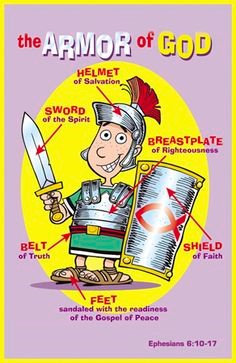
Depiction of spiritual armour. (No armour for the back - no running away.)
Some people don't take Satan seriously enough; others take him too seriously and spend time seeking him out, looking for a fight. We are given spiritual armour (all are different perspectives of the Gospel) to fight and win in the spiritual realm. Slip it on and stand firm. We are called to stand, to be strong in the Lord, with confidence. Don't forget the key element of prayer (v. 18), which is often overlooked.
Sequel
Paul spent more time with the Ephesian church than with any other. The emotional farewell recorded in Acts 20 gives us a glimpse of Paul's attachment to the community. During his last visit to the city, Paul warned that false prophets (including some from their own midst) would arise like "wolves" to destroy the church (Ac 20:29-31). They would attempt to break it up, or bring its members into their own folds. The biggest enemies of the Ephesian church were not persecution, the followers of Diana, political opposition, or heresy, but "white ants". Scientists tell us that the most dangerous animals are the smallest, including invisible disease-carrying microbes, etc. It is the same in the church. The principal enemies are not political systems or atheistic social theories, but small viruses that enter the community and wreak havoc.
The church in Ephesus ended up with a reputation for standing up to false doctrine (Rev 2:3, 6). The tragedy was that, in the process, they left their first love for Christ; they became so caught up in the issues of the day that they lost the spontaneity and authenticity of genuine Christian believers. How can we prevent that? By getting back to basics, recognizing and submitting to leadership placed in the Body of Christ by Jesus Christ the head, by learning, engaging, cooperating and being open to God and focused on Him. This does not stop winds blowing, or waves crashing against our lives, but it ensures us that we will be able to navigate safely and with stability.
"When I think of all this, I fall to my knees and pray to the Father, the Creator of everything in heaven and on earth. I pray that from his glorious, unlimited resources he will empower you with inner strength through his Spirit. Then Christ will make his home in your hearts as you trust in him. Your roots will grow down into God's love and keep you strong. And may you have the power to understand, as all God's people should, how wide, how long, how high, and how deep his love is.
May you experience the love of Christ, though it is too great to understand fully. Then you will be made complete with all the fullness of life and power that comes from God. Now all glory to God, who is able, through his mighty power at work within us, to accomplish infinitely more than we might ask or think. Glory to him in the church and in Christ Jesus through all generations forever and ever! Amen." (3:14-21)
For Reflection:
- we are all parts of one Body of Christ, building blocks in one temple of the Holy Spirit - what does this say for the kinds of relationships we ought to have?
- God's work in our lives is "to the praise of His glory" - what does that mean in your life?
- the description of mutual/interpersonal relationships is interesting - what does it mean for your own relationships (marriage, parents, children, employer/employees)?
- are there obstacles in your relationships with others that make "unity" unattainable? How can you re-adjust those relationships to meet the unity Ephesians speaks about?
- 4:11-16 articulate a healthy model for Christian ministry - what ministry/ies has God placed in your life, and how are you developing and using them?
- pray that you will discover "spiritual wisdom and insight so that you might grow in your knowledge of God.... that your heart will be flooded with light so that you can understand the confident hope he has given to those he calledóhis holy people who are his rich and glorious inheritance" (1:17, 18).






